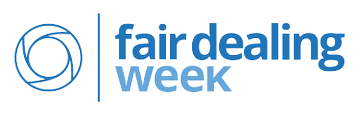
What is fair dealing: The Canadian Copyright Act allows the use of material from a copyright protected work (literature, musical scores, audiovisual works, etc.) without permission when certain conditions are met. Anyone can use fair dealing for research, private study, education, parody, satire, criticism, review, and news reporting. In order to ensure your copying is fair, you need to consider several factors such as the amount you are copying, whether you are distributing the copy to others, and whether your copying might have a detrimental effect on potential sales of the original work.
“Fair Dealing/Fair Use week is an annual initiative commissioned by the Association of Research Libraries (ARL). While fair use and fair dealing are employed on a daily basis by students, faculty, librarians, journalists, and all users of copyrighted material, Fair Use/Fair Dealing Week is a time to promote and discuss the opportunities presented, celebrate successful stories and explain the concept.”
More information on fair dealing in context of possible use cases at UVic can be found in our copyright brochure.
https://fair-dealing.ca/events/
Here are some events organized by libraries in British Columbia.
Date: Tuesday, February 22nd
Time: 10-11 (PST)
Speakers: Lucie Guibault, Professor of Intellectual Property Law and Associate Director of the Law and Technology Institute, Schulich School of Law, Dalhousie University
Presentation: Fair Dealing in Education: The Students’ Perspective
Host: Council of Atlantic University Libraries
Registration: https://docs.google.com/forms/d/163yngv0JvsA-nPnAEkiShgruFmMZTAuLQIrFkiRlW7A/viewform?edit_requested=true
The Lower Mainland Copyright Consortium (CapU, Douglas, JIBC, SFU, and UBC) and the Alberta Copyright Consortium (U of A, U of C, MRU and NAIT) will be co-hosting an online event on Wednesday, February 23. The program is as follows:
Date: Wednesday, February 23rd
Time: 1300-1400 Eastern (1000-1100 Pacific)
Speaker: Dr. Carys J. Craig, Associate Professor, Osgoode Hall Law School, York University
Presentation: Best Practices for OER in Canada: A Fresh Look at Fair Dealing for Educational Use
Register: Go to the Fair Dealing Week 2022 Event page for more information and to register.
Date: Wednesday, February 23rd
Time: 1500-1600 Eastern (1200-1300 Pacific)
Speaker: Dr. Meera Nair, Copyright Specialist, Northern Alberta Institute of Technology
Presentation: Fair Dealing’s future – artificial intelligence or willful ignorance?
Register: Go to the Fair Dealing Week 2022 Event page for more information and to register.

